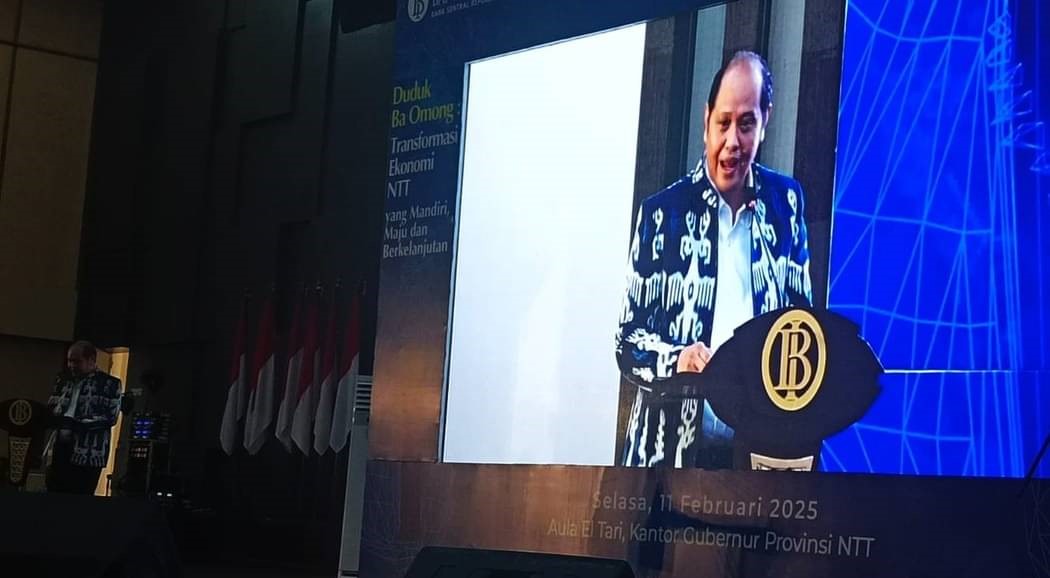News
East Nusa Tenggara economy improves despite investment, export slowdown
WINDONESIA February 19, 2025 BI East Nusa Tenggara Head Agus Sistyo Widjajati. (Media Indonesia/Palce Amalo)
BI East Nusa Tenggara Head Agus Sistyo Widjajati. (Media Indonesia/Palce Amalo)
Amid slowing investment and exports, the economy of East Nusa Tenggara still continues to improve as its growth rate increased from 3.47 percent year-on-year (yoy) in 2023 to 3.73 percent yoy in 2024. Household consumption and government consumption are the main contributors to the improvement.
The growth of investments to East Nusa Tenggara fell from 6.16 percent yoy in 2023 to 1.35 percent yoy in 2024, while the province's export growth rate dropped from 20.02 percent yoy growth in 2023 to 3.98 percent yoy contraction in 2024.
"This is also accompanied by an increase in the performance of sectors related to passenger transportation and tourism, as well as government spending activities. This development indicates that the purchasing power of East Nusa Tenggara's people is well maintained, and is able to support economic growth amid various limitations that affect the weakening of investment and exports," said Bank Indonesia (BI) East Nusa Tenggara Head Agus Sistyo Widjajati while speaking at the "Duduk Ba Bicara: East Nusa Tenggara Economic Transformation" activity in Kupang City, East Nusa Tenggara on Feb. 11, 2025.
The activity was also attended by Acting East Nusa Tenggara Governor Andriko Noto Susanto, East Nusa Tenggara Governor-elect Melkiades Laka Lena, Indonesian Chamber of Commerce and Industry (Kadin) Deputy Chair for Industry Saleh Husin, Expert Staff for , Coordinating Ministry for Food Maritime Economics Expert Staff Sugeng Santoso, along with academics and creative economy practitioner Dwinta Larasati.
Agus invited various parties to jointly encourage East Nusa Tenggara's economic recovery amid less than optimal global economic recovery. Indonesia's economic prospects are more resilient according to BI's projections, as investment continues to improve, household consumption is maintained, non-oil and gas exports grew relatively high, and inflation remains under control.
Meanwhile, the East Nusa Tenggara economy is estimated to grow higher towards the 3.65 to 4.25 percent range in 2025.
"This estimate should also be supported by the inflation rate in 2025, which is expected to remain within its target. We are optimistic because in the coming years there will be improvements in food productivity, a more welcoming [investment] climate, as well as private investment in the tourism and energy sectors," he explained.
Agus added that synergy is the key to the success of East Nusa Tenggara's economic transformation, such as improved agricultural productivity, accelerated investment to the food and beverage industry, inflation under control, and digitalization of local governments.
Acting East Nusa Tenggara Governor Andriko Noto Susanto said that there are four sectors that can be maximized to increase East Nusa Tenggara's locally-generated income (PAD), namely tourism and the creative economy, marine resources, agriculture, as well as new and renewable energy (NRE) and connectivity.
However, he noted that the province still has very high dependence on transfer payment from the central government's state budget. East Nusa Tenggara's regional budget is Rp5.3 trillion, while East Nusa Tenggara's PAD only reached Rp1.5 trillion.

